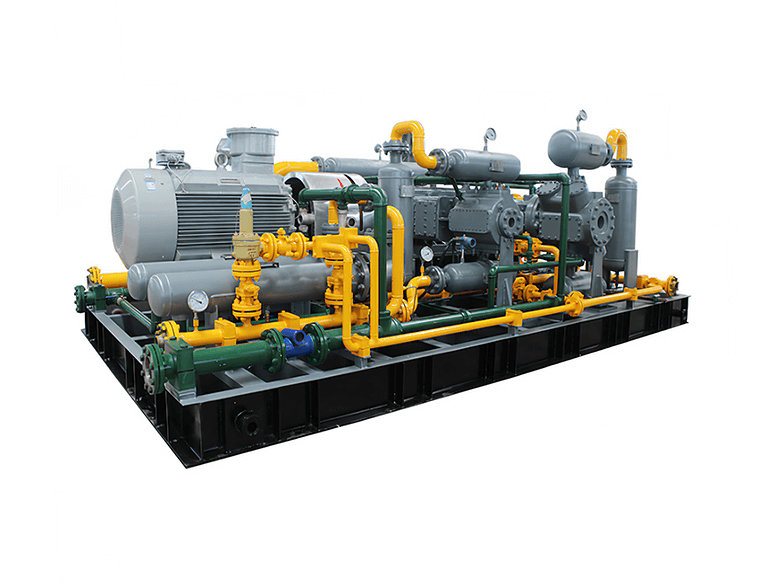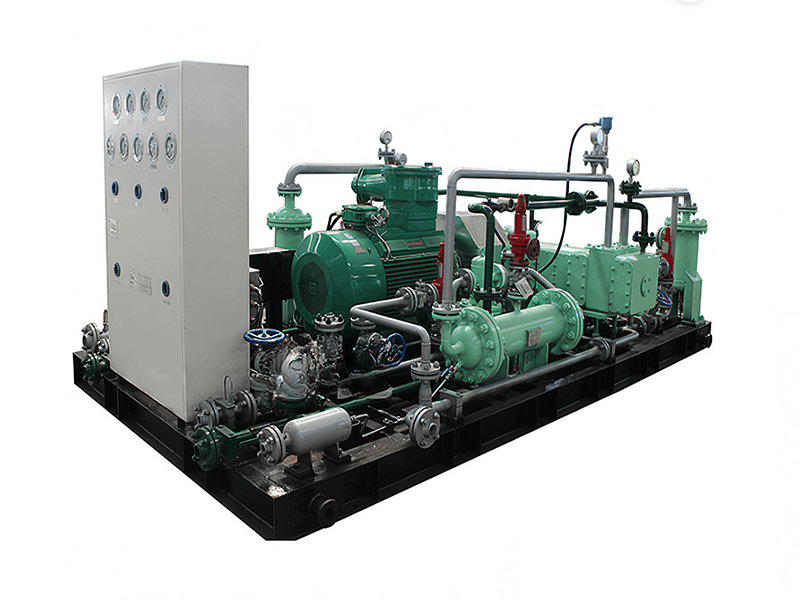1. In terms of process requirements
Pressure requirements:
Different chemical processes have different requirements for hydrogen pressure. For example, hydrocracking processes typically require a hydrogen pressure of around 1020MPa, while some hydrogenation reactions in fine chemicals may require higher pressures, such as 3050MPa. Therefore, when selecting, it is necessary to ensure that the Hydrogen Compressor can achieve and maintain the required pressure for the process stably. For processes that require high pressure, it may be necessary to choose a multi-stage compression compressor, such as a multi-stage reciprocating hydrogen compressor, to gradually increase the hydrogen pressure through multi-stage compression to meet the process requirements.
Traffic requirements:
The scale of chemical production determines the demand for hydrogen flow rate. Large scale chemical facilities, such as large-scale ammonia synthesis plants, may require tens of thousands of cubic meters of hydrogen flow per hour, while small fine chemical experimental facilities may only require a few cubic meters of hydrogen flow per hour. Choose a compressor with a suitable flow range based on the actual production scale and hydrogen flow demand. For high flow demand, centrifugal hydrogen compressors are a good choice as they can efficiently process large amounts of hydrogen gas; For low flow demand, reciprocating hydrogen compressors or adsorption hydrogen compressors may be more suitable.
Hydrogen purity requirements:
In chemical processes, some reactions require extremely high purity of hydrogen, such as hydrogenation reactions in some organic synthesis, which require hydrogen purity to reach 99.9% or above. In this case, it is necessary to choose a compressor that can ensure the purity of hydrogen gas, such as a diaphragm hydrogen compressor, which can prevent impurities such as lubricating oil from entering the hydrogen gas through special structural design (such as diaphragm isolation), ensuring the high purity of hydrogen gas. For some processes that do not require particularly high hydrogen purity, such as reactions that use hydrogen as a protective gas, the purity requirements can be appropriately relaxed when selecting compressors.
2. In terms of gas characteristics
corrosive:
If hydrogen contains corrosive impurities such as hydrogen sulfide, hydrogen chloride, etc., the material selection of the compressor is crucial. For this situation, it is necessary to choose a compressor with good corrosion resistance, or the key components of the compressor (such as cylinders, pistons, valves, etc.) should be made of corrosion-resistant materials. For example, using a reciprocating hydrogen compressor made of stainless steel material, or applying anti-corrosion coating on the surface of key components inside the compressor to prevent corrosion damage and extend the service life of the compressor.
Temperature and humidity characteristics:
Some chemical processes may cause changes in the temperature and humidity of hydrogen gas. If the hydrogen temperature is too high, it will affect the performance of the compressor, such as reducing volumetric efficiency and increasing energy consumption. Therefore, it is necessary to consider whether the operating temperature range of the compressor can adapt to the temperature changes of hydrogen gas. For hydrogen with high humidity, attention should be paid to preventing moisture from condensing inside the compressor. It may be necessary to install a drying device before the compressor or choose a compressor with waterproof measures, such as a reciprocating hydrogen compressor with a drainage system.

3. In terms of operational reliability
Continuous operation capability:
Chemical production usually operates continuously, and once the hydrogen compressor malfunctions, it may cause the entire production process to be interrupted, resulting in huge economic losses. So it is necessary to choose a compressor with high reliability and continuous operation capability. For example, a centrifugal hydrogen compressor can operate stably for a long time under normal maintenance. Its structure is relatively simple and there are no easily worn pistons or other components, which can meet the requirements of the chemical industry for continuous operation. Meanwhile, it is also necessary to consider the backup equipment or redundant design of the compressor, so that in the event of a compressor failure, it can be switched in a timely manner to ensure the continuity of production.
Convenience of maintenance and upkeep:
Chemical companies need to regularly maintain compressors to ensure their normal operation. Therefore, when selecting, the convenience of maintenance and upkeep of the compressor should be considered. For example, selecting components that are easy to disassemble and install to facilitate inspection, repair, and replacement by maintenance personnel. For some complex compressors, such as diaphragm hydrogen compressors, it is necessary to consider whether the replacement of key components such as the diaphragm is convenient, as well as whether there is professional technical support and maintenance services. At the same time, the maintenance cycle should also be considered. Choosing compressors with long maintenance cycles and low maintenance costs can reduce the operating costs of the enterprise.
4. In terms of cost-effectiveness
Initial investment cost:
The initial investment cost of different types of hydrogen compressors varies greatly. Generally speaking, centrifugal hydrogen compressors and ionic liquid compressors have high initial investment costs due to their high technological content and complex equipment; However, reciprocating hydrogen compressors and adsorption hydrogen compressors have relatively simple structures and lower initial investment costs. When selecting, it is necessary to consider the performance and price of the compressor comprehensively based on the budget and cost control requirements of the enterprise, and choose equipment with high cost-effectiveness. For example, for small chemical enterprises or projects with limited budgets, reciprocating hydrogen compressors with relatively low prices can be chosen.
Operating costs:
Operating costs include energy consumption, lubricant consumption, maintenance costs, etc. In terms of energy consumption, different types of compressors have different energy consumption under different operating conditions. For example, centrifugal hydrogen compressors have lower energy consumption under high flow and medium low pressure conditions, while reciprocating hydrogen compressors may be more energy-efficient under low flow and high pressure conditions. Select compressors with low energy consumption based on the actual operating conditions of chemical processes. In terms of lubricant consumption, some compressors (such as diaphragm hydrogen compressors) do not require lubricant or consume very little lubricant, which can reduce operating costs. In addition, the maintenance cost of the compressor should also be considered, including the cost of replacing vulnerable parts and the labor cost of maintenance. Choosing a compressor with low maintenance costs can improve the economic efficiency of the enterprise.

























